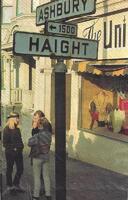Love on Haight: The Grateful Dead and San Francisco in 1967
"Turn on, Tune in, Drop out"
Approximately 75,000 young people converged in the Haight-Ashbury neighborhood of San Francisco in the summer of 1967. Drawn to the area by a shared rejection of dominant American morals and cultural values, these “hippies” sought to manifest a new mode of authentic living by dropping out of society.
Several social and cultural factors made the Summer of Love possible. Fueled by a mistrust of government, a disdain for materialism and censorship, and empowered to challnege societal prejudices, young people flocked to the Haight and embraced Timothy Leary’s call to "turn on, tune in, drop out."
The hippie phenomenon
Mainstream media coverage of the “hippie phenomenon” portrayed a menacing, yet enticing lifestyle of excess that attracted more high school and college students from around the country to experience the free love movement. While it was a short-lived phenomenon, the Summer of Love produced lasting cultural legacies, including that of the Grateful Dead which has endured for half a century.
Representation: Crafting the Summer of Love
This online exhibit focuses on the different modes of representation that translated and transformed the Summer of Love from a hippie movement in San Francisco to a nation-wide spectacle and invited young people to the Haight. Materials include mainstream and underground media articles that spread the word about life on the Haight, Beat poetry and small press publications that elevated the langauge of the hippie, and broadsides that activated the youth population to confront political and societal norms.
More in Dead Central
Visit Dead Central at McHenry Library to learn more and see primary materials from the UCSC Special Collections & Archives that document daily life in the Haight-Ashbury during the Summer of Love.
